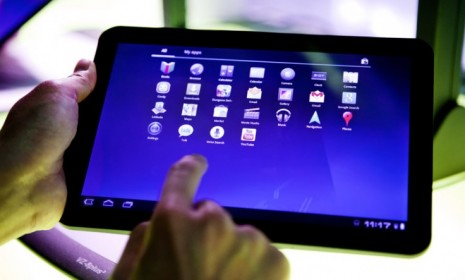Google's 'mysterious' experiment in home entertainment systems
The internet search giant is setting its crosshairs on your living room. Would an Android-powered home catch on?

A free daily email with the biggest news stories of the day – and the best features from TheWeek.com
You are now subscribed
Your newsletter sign-up was successful
Google has asked the Federal Communications Commission for permission to test a top secret home entertainment device in four U.S. cities. According to the application, the system will connect through home Wi-Fi networks and Bluetooth to other home electronics, including lightbulbs, speakers, and TV sets. Is this move a natural progression for Google, or does it have flop written all over it? Here's what you should know about the company's "mysterious" experiment:
What exactly is this device?
Google is keeping a tight lid on the project. But the "initial purpose of the device will be for streaming music" through a person's home, say David Streitfeld and Nicole Perlroth at The New York Times, with the aim to move into "much wider" territory later. It could be related to a project called "Android@Home" says Chris Davis at Slashgear, which was demonstrated at Google I/O in 2011. The system allows users to control various devices scattered through the house while connecting them with an Android-based operating system. For example, someone would theoretically be able to play music from an Android tablet on Google-made speakers throughout the home.
The Week
Escape your echo chamber. Get the facts behind the news, plus analysis from multiple perspectives.

Sign up for The Week's Free Newsletters
From our morning news briefing to a weekly Good News Newsletter, get the best of The Week delivered directly to your inbox.
From our morning news briefing to a weekly Good News Newsletter, get the best of The Week delivered directly to your inbox.
Why move into home electronics?
It's simple. "As the Internet matures," say the Times' Streitfeld and Perlroth, "the leading companies are trying to create full-fledged ecosystems to preserve their individual dominance." That's why Amazon started making tablets, and why Apple moved from hardware to selling content through iTunes. Such a move would allow Google to lock users into its products and online marketplaces.
Is this a wise move?
It will diversify Google's product line, at least. The company is "looking for promising gushers other than its gangbusters search advertising business," says Jessica Guynn at the Los Angeles Times, "which accounts for nearly all of its revenue." Earlier this year, the company paid $12.5 billion to acquire Motorola Mobility — a hardware manufacturer that specializes in "set-top boxes and mobile handsets." By moving into consumer electronics with more Google-branded products, Google is moving "into closer competition with Apple."
A free daily email with the biggest news stories of the day – and the best features from TheWeek.com
When would the new device come out?
It's too early to say. Google is just requesting to test a prototype in select cities, including New York and Los Angeles. The FCC filing asked to test 252 devices between Jan. 17 and July 17. And remember, says Casey Johnston at Ars Technica, this is merely the testing phase, so it's possible that nothing will "ever come into consumers' hands that resembles anything like this."
Sources: Ars Technica, Giga OM, LA Times, NY Times, Slashgear (2)
-
 Why is the Trump administration talking about ‘Western civilization’?
Why is the Trump administration talking about ‘Western civilization’?Talking Points Rubio says Europe, US bonded by religion and ancestry
-
 Quentin Deranque: a student’s death energizes the French far right
Quentin Deranque: a student’s death energizes the French far rightIN THE SPOTLIGHT Reactions to the violent killing of an ultraconservative activist offer a glimpse at the culture wars roiling France ahead of next year’s elections
-
 Secured vs. unsecured loans: how do they differ and which is better?
Secured vs. unsecured loans: how do they differ and which is better?the explainer They are distinguished by the level of risk and the inclusion of collateral